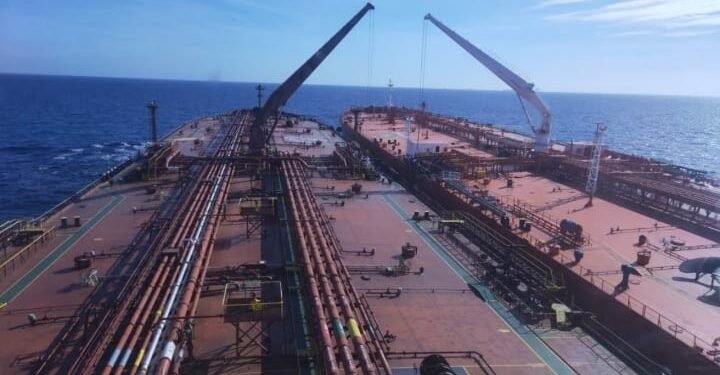Tokyo based business daily Nikkei has reported that after the “West” sanctioned Russia over its war in Ukraine, Russian Oil continues to flow to Europe unabated, but through a hidden maritime route.
A Nikkei analysis published on Wednesday stated that over the past six months, it identified 41 vessels that made ship-to-ship transfers of oil by tankers that left Russian ports and later arrived at European ports. The transfers were made off the coast of Greece the business daily reported.
Also read; Nigeria Islamic Court orders arrest of local celebrities
in February, President Putin ordered the Russian army to enter Ukraine, masking the invasion under a “special military operation” tag. NATO and her allies responded with massive sanctions on Russia, intended to cripple the Russian economy and limit its ability to export Oil.
Over the past six months however, 41 vessels have made ship-to-ship transfer of oil, with the oil headed to Europe. In comparison, there was only one such vessel in the whole of 2021.
An embargo on Russian Oil by the European Union and the United Kingdom that will completely ban imports of Russian Oil by sea will come into effect by February 2023 and December 2022 respectively.
Companies are embarking on this oil shipment routes to hide the origin of the oil, thus avoiding criticism and associated sanctions that already impact the seamless flow of oil from Russia to Western Europe.
An extract from the Nikkei reads;
On Aug. 24, Nikkei photographed the transfer of oil from one tanker to another in the Laconian Gulf near southern Greece. One tanker was the Greek-registered Sea Falcon, which left the port of Ust-Luga, an oil shipping terminal in northwestern Russia, on Aug. 4. The other was the Indian-flagged Jag Lok, which departed from a Turkish port of Aliaga on Aug. 4. Small boats surrounded the tankers, assisting with the transfer.“
There is a major risk of accidents causing oil to flow into the sea. Exhaust gas and garbage emitted by oil tankers are also a problem, causing trouble for both the fisheries and tourist industries,” said local resident Thalis Ladakakis. The 55-year-old man said the number of tankers has spiked since Russia’s invasion of Ukraine began on Feb. 24.
Nikkei stated that to answer the question of where the Russian oil was going, it used data from British data company Refinitiv to see where tankers that left Russian ports, starting on Feb. 24, went and which vessels contacted them.
The survey covered waters off the Mediterranean coast of Greece, where ship-to-ship transfers frequently take place. Automatic Identification System (AIS) signals from vessels were tracked to identify their routes. Changes in the vessels’ draft — the distance from the waterline to the bottom of the hull, which increases when a ship is heavily laden — were also checked to determine the number of ship-to-ship transfers.
Over the six months through Aug. 22, Nikkei confirmed 175 transfers off the Greek coast involving tankers from Russia. There were only nine such transfers during the same period last year. Refinitiv data shows that Russia exported 23.86 million barrels of oil for ship-to-ship transfers off Greece. During the same period last year, 4.34 million barrels were shipped for similar transfers.
The question is where the tankers that received the oil went after taking on their loads.
Nikkei tracked the routes of the ships, confirming that 89 tankers arrived at ports, while only three such calls were made last year. Of those, 41 arrived at ports in Greece, Belgium and elsewhere in Europe. Only one tanker did so last year. Two tankers made port calls in Britain, which is a staunch advocate of economic sanctions against Russia. The survey highlighted the crucial role that waters near Greece play as a hub for oil shipments between Russia and Europe.
A part of the report stated how Russian Oil was brokered and deliver to a UK oil wholesaler.
Tracking shipments of oil that arrived in Britain in June, using Refinitiv’s route and draft data, as well as satellite images from U.S Company Planet Labs, Nikkei found that a Maltese-flagged tanker that took on oil off the Greek coast from two tankers that left Russian ports arrived at Immingham, in eastern Britain, on June 4.
Records from European energy research company Kpler show that the tanker carried 300,000 barrels of oil produced by Russia’s state-run oil producer Rosneft. Swiss-based commodity trading house Trafigura brokered the oil and sold it to Prax Group, a medium size British oil wholesaler.
Having imposed sanctions to cut off Russia’s sources of finance, the over reliance of Europe on Russian Oil and gas indicates that the oil will likely continue to flow, hence the effect of the sanctions will be limited.
Nnamdi Maduakor is a Writer, Investor and Entrepreneur
























































